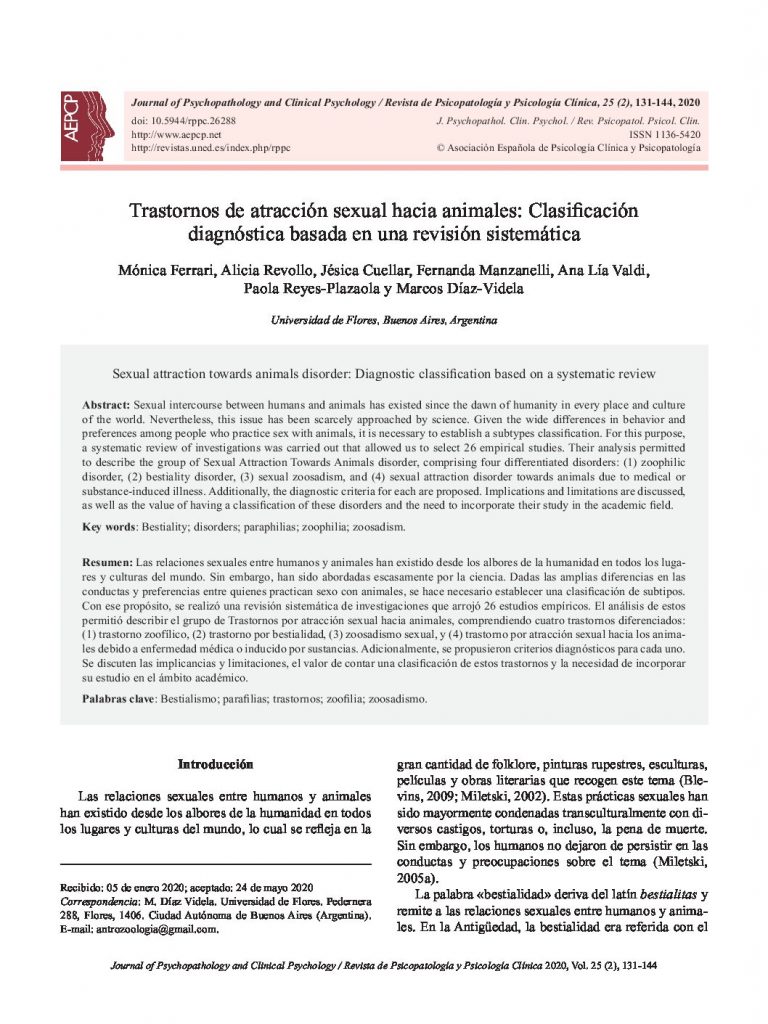Trastornos de atracción sexual hacia animales: Clasificación diagnóstica basada en una revisión sistemática
Trastornos de atracción sexual hacia animales: Clasificación diagnóstica basada en una revisión sistemática

- Trastornos de atracción sexual hacia animales: Clasificación diagnóstica basada en una revisión sistemática
- Spanish version of the Adult Executive Functioning Inventory (ADEXI): Psychometric properties in adults with Autism Spectrum Disorders and Intellectual Disability
- Evidencias de validez y fiabilidad de la versión en español del Children’s Depression Inventory-Short en población peruana
- Factor structure of the Posttraumatic Growth Inventory in a Spanish sample of adult victims of interpersonal violence in childhood
- Decision making in adults with autism: The role of ecological executive dysfunctions
- Psychological distress in critically ill patients: Risk and protective factors
Sexual intercourse between humans and animals has existed since the dawn of humanity in every place and culture of the world. Nevertheless, this issue has been scarcely approached by science. Given the wide differences in behavior and preferences among people who practice sex with animals, it is necessary to establish a subtypes classification. For this purpose, a systematic review of investigations was carried out that allowed us to select 26 empirical studies. Their analysis permitted to describe the group of Sexual Attraction Towards Animals disorder, comprising four differentiated disorders: (1) zoophilic disorder, (2) bestiality disorder, (3) sexual zoosadism, and (4) sexual attraction disorder towards animals due to medical or substance-induced illness. Additionally, the diagnostic criteria for each are proposed. Implications and limitations are discussed, as well as the value of having a classification of these disorders and the need to incorporate their study in the academic field.
Las relaciones sexuales entre humanos y animales han existido desde los albores de la humanidad en todos los lugares y culturas del mundo. Sin embargo, han sido abordadas escasamente por la ciencia. Dadas las amplias diferencias en las conductas y preferencias entre quienes practican sexo con animales, se hace necesario establecer una clasificación de subtipos. Con ese propósito, se realizó una revisión sistemática de investigaciones que arrojó 26 estudios empíricos. El análisis de estos permitió describir el grupo de Trastornos por atracción sexual hacia animales, comprendiendo cuatro trastornos diferenciados: (1) trastorno zoofílico, (2) trastorno por bestialidad, (3) zoosadismo sexual, y (4) trastorno por atracción sexual hacia los animales debido a enfermedad médica o inducido por sustancias. Adicionalmente, se propusieron criterios diagnósticos para cada uno. Se discuten las implicancias y limitaciones, el valor de contar una clasificación de estos trastornos y la necesidad de incorporar su estudio en el ámbito académico.



